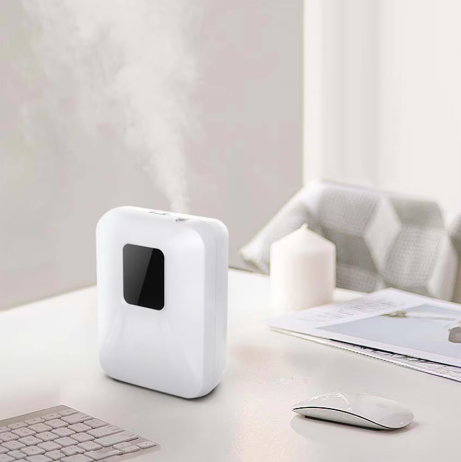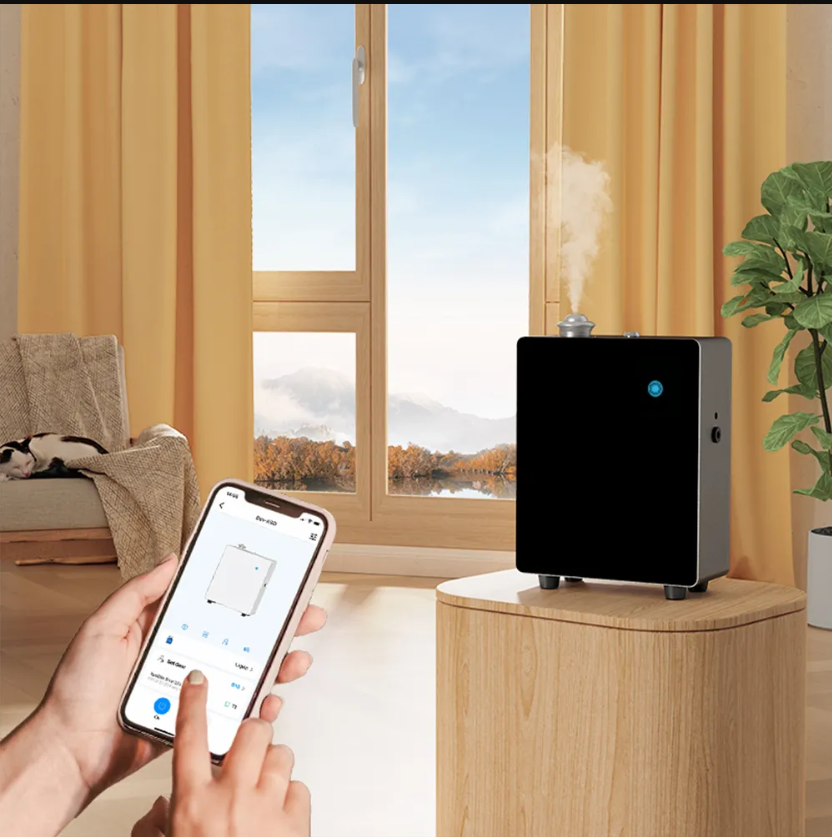Ottimizzare i sistemi di profumazione dell'hotel per un'esperienza impeccabile dei clienti
L'arte di creare l'atmosfera perfetta nel tuo hotel inizia nel momento stesso in cui gli ospiti varcano la soglia. Una macchina per profumazione hotel svolge un ruolo fondamentale nella creazione di un'impressione indimenticabile, mantenendo costante l'esperienza sensoriale per tutto il soggiorno. Programmando correttamente la macchina per profumazione dell'hotel, è possibile migliorare la soddisfazione degli ospiti, ottimizzare l'efficienza operativa e ridurre gli sprechi inutili.
L'ospitalità moderna richiede soluzioni di aromatizzazione sofisticate in grado di adattarsi a livelli di occupazione variabili e ai modelli di traffico degli ospiti. Comprendere come programmare efficacemente la macchina per aromi dell'hotel non solo garantisce un'atmosfera accogliente durante le ore di punta del check-in, ma aiuta anche a mantenere la convenienza economica durante i periodi più tranquilli.
Comprensione delle Fondamenta della Programmazione delle Macchine per Aromi negli Hotel
Componenti di Programmazione di Base
Una macchina per aromi in hotel funziona combinando meccanismi temporizzati e controlli di intensità. L'interfaccia di programmazione di base include generalmente impostazioni per le ore di funzionamento, i livelli di intensità dell'aroma e gli intervalli di diffusione. La maggior parte dei sistemi moderni dispone di controlli digitali che permettono regolazioni precise e opzioni di programmazione.
I modelli avanzati integrano tecnologie intelligenti che possono essere collegate al sistema di gestione della struttura, permettendo regolazioni automatiche basate sui dati di occupazione in tempo reale. Questa capacità di integrazione è particolarmente utile per le strutture di grandi dimensioni con più aree di profumazione e diversi livelli di traffico durante la giornata.
Mappatura dei Flussi di Traffico
Prima di programmare la macchina per la profumazione dell'hotel, è essenziale analizzare il normale flusso di ospiti nella struttura. Iniziate raccogliendo dati sugli orari di check-in, il traffico nell'atrio e le variazioni stagionali di occupazione. Queste informazioni costituiscono la base per creare un programma di profumazione efficace, adatto alle esigenze specifiche del vostro hotel.
Valutate di tracciare i movimenti in diverse aree della struttura, poiché alcune zone potrebbero richiedere intensità o tempi di profumazione differenti. Ad esempio, l'atrio potrebbe necessitare di una profumazione più intensa durante i picchi di check-in, mentre i corridoi potrebbero trarre beneficio da livelli più costanti e moderati per tutta la giornata.

Tecniche Strategiche di Programmazione
Programmazione Temporale
Implementa una strategia di programmazione basata sul tempo che si allinea con i periodi di massimo afflusso del tuo hotel. La maggior parte degli hotel sperimenta picchi di check-in nel tardo pomeriggio e nelle prime ore della sera. Programma la macchina per la diffusione della fragranza del tuo hotel per aumentare l'erogazione durante questi momenti di alto traffico, assicurandoti che la fragranza rimanga percepibile senza diventare eccessiva.
Crea diversi profili di programmazione per i giorni feriali rispetto ai fine settimana, poiché le abitudini di check-in spesso variano notevolmente. Considera anche eventuali aggiustamenti stagionali, tenendo conto di come i cambiamenti di temperatura e umidità possano influenzare la dispersione della fragranza all'interno della struttura.
Gestione dell'Intensità
Una corretta gestione dell'intensità è cruciale sia per il comfort degli ospiti che per l'efficienza dei costi. Programma la macchina per la diffusione della fragranza del tuo hotel per funzionare a diversi livelli di intensità durante il giorno. Durante i periodi di massimo afflusso, mantieni livelli ottimali di fragranza nelle aree principali riducendo l'erogazione nelle zone meno frequentate.
Valutare l'implementazione di un aumento graduale dell'intensità in prossimità dei periodi di punta, piuttosto che variazioni improvvise. Questo approccio aiuta a mantenere un ambiente più naturale e piacevole, prevenendo l'affaticamento olfattivo tra personale e ospiti.
Strategie Avanzate di Ottimizzazione
Implementazione del controllo per zone
Per hotel con più zone di profumazione, implementare una programmazione strategica del controllo per zone. Questo consente una distribuzione personalizzata del profumo in base alle esigenze specifiche di ciascuna area. Le aree del reception potrebbero richiedere una profumazione più intensa durante i picchi di check-in, mentre le aree ristorante necessitano di regolazioni più delicate attorno agli orari dei pasti.
Creare profili di programmazione distinti per ciascuna zona, assicurandosi al contempo un'esperienza olfattiva coerente in tutto l'edificio. Considerare come i modelli di flusso d'aria e i sistemi HVAC influenzano la distribuzione del profumo durante la configurazione delle impostazioni specifiche per zona.
Soluzioni di programmazione adattativa
Utilizza funzionalità di programmazione adattive che rispondono alle condizioni in tempo reale. Alcuni sistemi per la diffusione di profumi negli hotel possono regolarsi automaticamente in base a fattori come tasso di occupazione, temperatura e livello di umidità. Questa tecnologia intelligente aiuta a ottimizzare la diffusione del profumo minimizzando gli sprechi.
Implementa meccanismi di feedback per monitorare l'efficacia della tua strategia di programmazione. Un controllo regolare e opportune regolazioni garantiscono che il programma di profumazione rimanga efficiente e vantaggioso in termini di costo, mantenendo al contempo i livelli desiderati di atmosfera.
Manutenzione e monitoraggio
Monitoraggio delle prestazioni del sistema
Il monitoraggio regolare delle prestazioni della macchina per la diffusione di profumi nell'hotel è essenziale per mantenere un funzionamento ottimale. Confronta il consumo del profumo con i livelli di occupazione per individuare eventuali inefficienze o aree in cui migliorare la tua strategia di programmazione.
Implementa un approccio sistematico per il monitoraggio dei livelli di profumo in diverse aree della tua struttura. Questi dati aiutano a perfezionare i parametri di programmazione e garantiscono un'esperienza uniforme agli ospiti, evitando un'eccessiva profumazione.
Pianificazione della Manutenzione Preventiva
Crea un programma completo di manutenzione che includa regolari controlli e calibrazioni del sistema. Una corretta manutenzione assicura che la macchina per il profumo dell'hotel funzioni in modo efficiente e fornisca risultati costanti in base alle tue specifiche di programmazione.
Forma il personale a riconoscere i segnali di inefficienza o malfunzionamento del sistema, permettendo interventi rapidi per regolazioni o riparazioni quando necessario. La manutenzione regolare aiuta a prevenire sprechi e garantisce prestazioni ottimali durante i periodi di punta.
Domande frequenti
Con quale frequenza dovrei aggiornare la programmazione della macchina per il profumo dell'hotel?
Esamina e aggiorna la tua macchina per gli aromi programmazione mensilmente, con ulteriori aggiustamenti in occasione di cambiamenti stagionali o variazioni significative nei modelli di occupazione. Un regolare perfezionamento assicura prestazioni ed efficienza ottimali, mantenendo l'esperienza desiderata per gli ospiti.
Quali fattori influenzano la dispersione della fragranza nel mio hotel?
Diversi fattori influenzano la dispersione della fragranza, tra cui il funzionamento del sistema HVAC, la temperatura della stanza, i livelli di umidità, l'altezza dei soffitti e i movimenti degli ospiti. Considera queste variabili quando programmi la macchina per fragranze del tuo hotel per diverse aree e momenti della giornata.
Come posso evitare la fatica olfattiva tra il personale e gli ospiti?
Programma la macchina per fragranze del tuo hotel per variare l'intensità durante la giornata e adotta una programmazione basata sulle zone. Questo approccio aiuta a prevenire l'affaticamento olfattivo mantenendo al contempo un'atmosfera accogliente. La rotazione regolare delle profumazioni può inoltre contribuire a mantenere l'efficacia e l'interesse degli ospiti.
Indice
- Ottimizzare i sistemi di profumazione dell'hotel per un'esperienza impeccabile dei clienti
- Comprensione delle Fondamenta della Programmazione delle Macchine per Aromi negli Hotel
- Tecniche Strategiche di Programmazione
- Strategie Avanzate di Ottimizzazione
- Manutenzione e monitoraggio
- Domande frequenti

